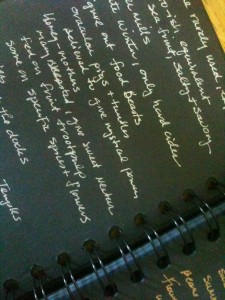
 One of the questions being raised repeatedly on a discussion board I participate on is the question of electronic rights. Should a magazine be able to buy a story and display it on their website in perpetuity without additional payment? Does it make a different whether or not it’s behind a paywall? If there’s no additional payment, when should rights revert? What happens with something like an anthology that is in electronic form and hence won’t go out of print the way a hard-copy edition does?
One of the questions being raised repeatedly on a discussion board I participate on is the question of electronic rights. Should a magazine be able to buy a story and display it on their website in perpetuity without additional payment? Does it make a different whether or not it’s behind a paywall? If there’s no additional payment, when should rights revert? What happens with something like an anthology that is in electronic form and hence won’t go out of print the way a hard-copy edition does?
I’m presuming that most people reading this know that normally when you “sell” a story to a publication, what they’re actually buying is the right to publish it in a particular form. You, the author, retain any rights not spelled out in the contract. You can (and I encourage you to) sell the story again as a reprint, and you may want to look at forms like audio or in another language.
This is something that’s still very new, and it’s not something that’s been factored in when lists like SFWA-qualifying markets were put together. It’s not mentioned on sites like Ralan.com or the Submission Grinder. As a writer, though, you need to be aware of what you’re selling.
Take some time to skim through the contract and find out what the publication is buying. What’s the “exclusive period,” the period where they are the only ones that can print it? What forms are they planning to release your work in? Here’s a Columbia Law School resource that may be helpful in trying to decipher legalese.
If you’re publishing, how do you feel about perpetual rights? Is the horse already well out of the barn as far as that goes, or can writers push back on the practice of acquiring perpetual rights without payment?
Enjoy this writing advice and want more content like it? Check out the classes Cat gives via the Rambo Academy for Wayward Writers, which offers both on-demand and live online writing classes for fantasy and science fiction writers from Cat and other authors, including Ann Leckie, Seanan McGuire, Fran Wilde and other talents! All classes include three free slots.
Prefer to opt for weekly interaction, advice, opportunities to ask questions, and access to the Chez Rambo Discord community and critique group? Check out Cat’s Patreon. Or sample her writing here.
...
Bryan Thomas Schmidt put together this developmental editing checklist for novels after the first session of my online editing class. (Details on the next time the editing class will be offered.)
I guest blogged on the Dark Continents website about why I believe Small Presses are the Risk-takers.
In TAFT 2012, a time-traveling President Taft gets dragged into the 2012 election cycle. I interviewed its author, Jason Heller, for the SFWA blog.
My story, Acquainted with the Night, can be found in a really fun anthology of superhero fiction put together by Lincoln Crisler, CORRUPTS ABSOLUTELY?
I’m appearing at MidSouthCon this weekend as their Editor Guest of Honor. While there I’ll be giving a talk entitled “We’re All Bozos On This Bus: The Truth About Electronic Publishing.” I’ll put the text up on here afterwards.
...

In The Late American Novel: Writers on the Future of Books, editors Jeff Martin and C. Max Magee have collected a number of new writers* talking about the future of books, and although the word has been interpreted quite differently by the different writers, there’s some insightful pieces included in the mix. Their introduction talks about the movement from printed page to the screen as a format change comparable to Gutenberg’s printing press. Like the printing press, the technology increases the accessibility of knowledge — though unfortunately that’s not a change tn which any of the essayists seem to be interested.
The truth about electronic publishing is that nobody is entirely sure what’s going on, and this book showcases that mix of cluelessness and well-educated guesses that seems to characterize these discussions. A phenomenon amplifying the scattershot approach of it all is that different essayists take the word “book” differently. In “A Book Is A Place,” Joe Meno talks about the book as an experience for the reader as he tries to define the word:
For me, a book, in whatever form it takes — hardbound copy, paperback, electronic version, online instrument, text downloaded on a cell phone, even a story read orally — a book is actually a place, a place where we, as adults, still have the chance to engage in active imagining, translating word to image, connecting these images to memories, dreams, and larger ideas.
...
Want access to a lively community of writers and readers, free writing classes, co-working sessions, special speakers, weekly writing games, random pictures and MORE for as little as $2? Check out Cat’s Patreon campaign.

"(On the writing F&SF workshop) Wanted to crow and say thanks: the first story I wrote after taking your class was my very first sale. Coincidence? nah….thanks so much."



This site is protected by reCAPTCHA and the Google Privacy Policy and Terms of Service apply. This site is a participant in the Amazon Services LLC Associates Program, an affiliate advertising program designed to provide a means for sites to earn advertising fees by advertising and linking to Amazon.com.